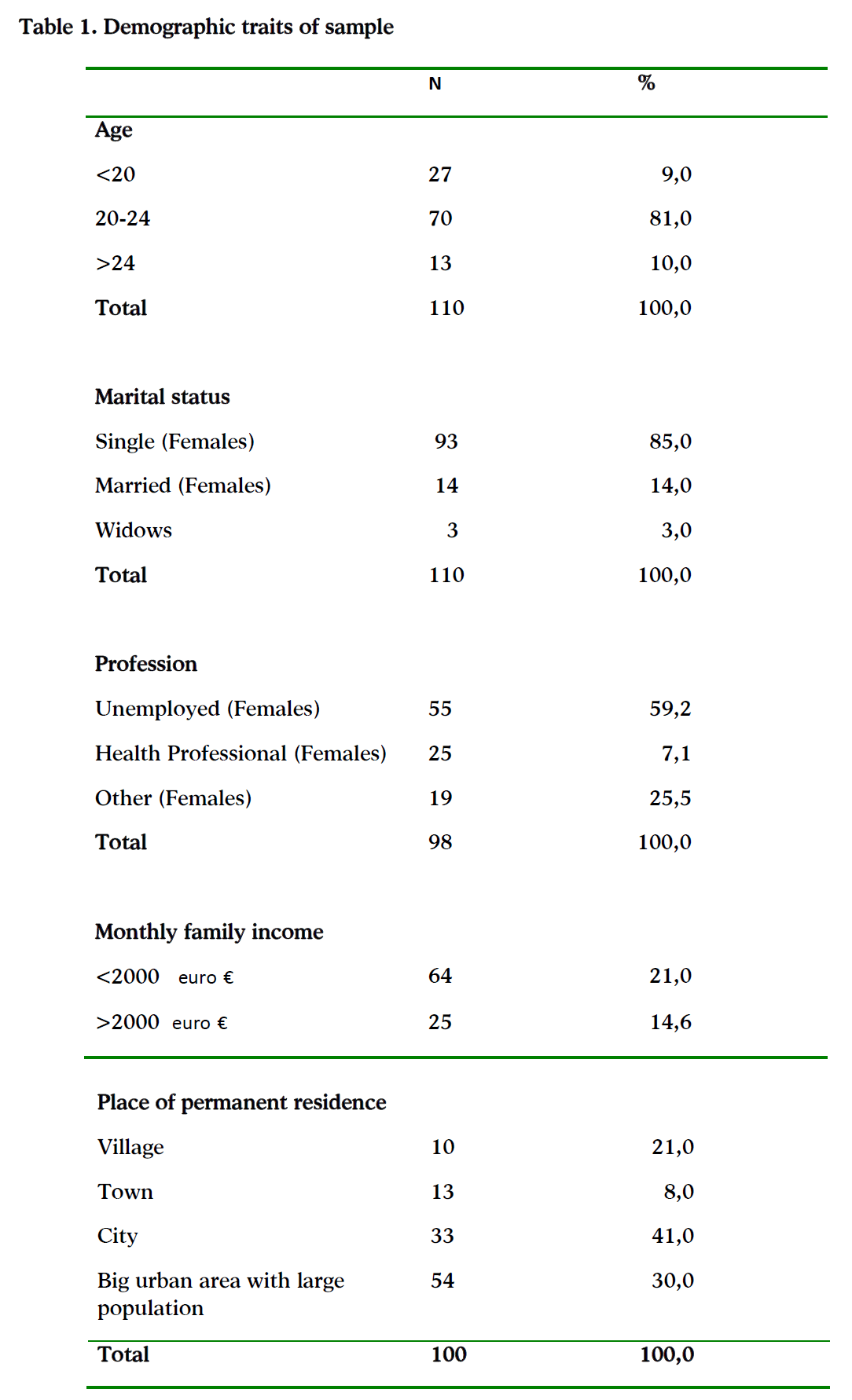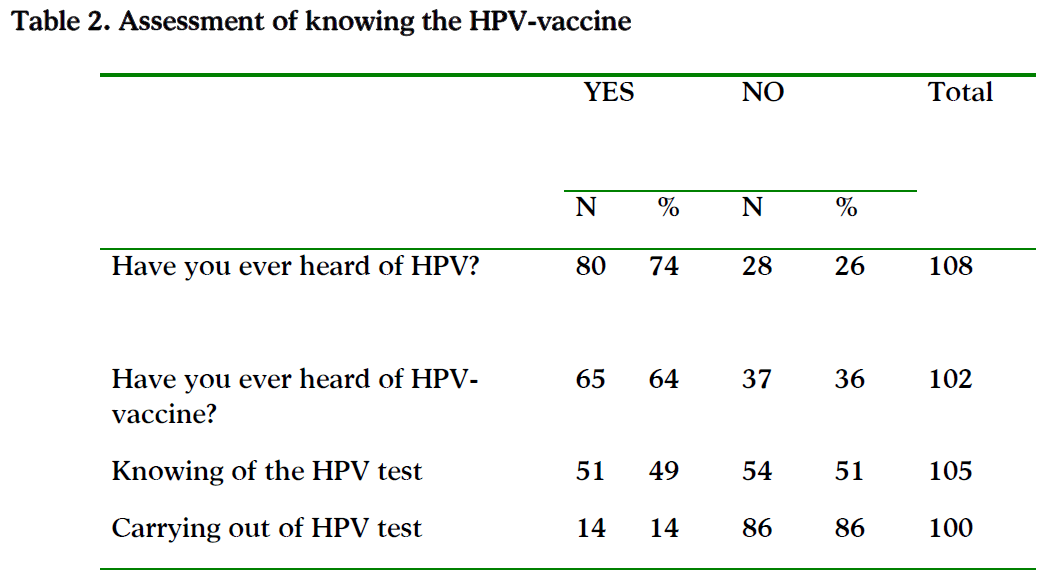Maria Labadiari1*, Christos Marneras2, Evagelia Harisi3, Dimitra Argiropoulou4, Ioulia Stiga5, Stiliani Mouchaki6, Christos Katsoulas7, Georgia Fouka8
1Midwife, Laboratory Assistant, Department of Nursing, Technological Educational Institute (TEI) of Lamia
2RN, University Hospital of Patras, Rio
3M.Sc, RN, University Hospital of Larisa
4RN, “St. Paul Hospital”, Thessaloniki
5Infectious diseases department, National Medical Center "La Raza", IMSS, Mexico City, Mexico
6RN, GRS Hospital “ Korialenio& Benakio”, Athens
7RN, TEI of Lamia
8Assistant Professor of Nursing, TEI of Athens
- *Corresponding Author:
- Labadiari Maria
Eslin 55 Street
Lamia, 35100
Phone: 22310 38555
E-mail: mlabadiar@med.uoa.gr
Key words
Human Papilloma Virus, prevention, vaccine, Nursing, students
Introduction
The primary prevention of cervical cancer is now possible and vaccines against human papilloma virus (HPV) are available. HPV is a major causative factor of cervical cancer. [1,2] Gradually, all developed European countries include the HPV vaccine in national immunization programs. [3,4] Vaccines against HPV protect against the most pathogenic and dangerous subtypes, i.e. 16 and 18. However, a quadrivalent vaccine is available, i.e. against subtypes 16, 18, 6 and 11. It offers protection not only against malformations and cervical cancer, but also against genital warts, which are one of the most common sexually transmitted diseases. [4] The success of prevention programs depends on the participation of the population, and on the knowledge of health professionals and their willingness to participate in respective programs. Studies have shown that not only reservations on safety and efficacy of the vaccine exist within health care professionals, but the latter often seem to ignore its existence as well. [5,6] There is hope that, as newer research data are being introduced into the curricula, improved perceptions of the new generation of health professionals will help current prevention programs to succeed. [7] The knowledge of young scientists acquired in their student years will constitute the foundation for the integration of new developments on the prevention of cervical cancer in primary care. Apart from their studies, socioeconomic factors affect perceptions of disease prevention, as citizens’ contact with the health care system is affected, and prejudices, that are often difficult to overcome, are created. [8,9,10,11]
The purpose of this study was to investigate a nursing department students’ knowing of HPV vaccine and correlation with socioeconomic factors, and prior conduct of Pap smear as well. Receptivity to vaccination against HPV is also investigated.
Material and Methods
110 nursing department students 18-54 years old, attending courses of the 5th and 6th semester participated in the research. The survey was conducted in a regional nursing department during the period March-April 2010. A questionnaire which included 66 closed-ended questions in relation to women’s knowledge on the prevention of cervical cancer, Pap smear, HPV, as well as their attitudes to vaccination concerning both themselves and their children, was used as a research tool. This questionnaire has been previously used in the research program "Lysistrata", as well as in other similar investigations in the Greek territory. [10,11] Each woman participated in the research after written consent and completed the questionnaire anonymously, in the presence of research team members. This study presents the results concerning the knowledge of existence of HPV vaccine.
Statistical Analysis
Descriptive statistics were applied and frequency tables were constructed for the variables under consideration. It is estimated that a number of factors are associated with knowing of the HPV vaccine. Both univariate and multivariate regression analysis of these factors were conducted. The level of statistical significance was set at p <0,05. Statistical analysis was performed with ‘SPSS 17.0’ software for Windows.
Results
The majority of students in the sample were 20-24 years old (70 women, accounting for 81%). 27 women were under 20 years of age (24.5%) and 13 over 24 years of age (10%). 93 women were single (85%) (Table 1). About 64% of female students were aware of the existence of vaccine against HPV, while less than half knew the existence of HPV test and even fewer had been tested (Table 2). When univariate analysis was applied, it was observed that those aged >20 and a prior carrying out of Pap smear correlated positively with knowing of the vaccine against HPV (Table 3). When these two variables were introduced to a model of multivariate analysis, a statistically significant association between each variable and knowing of the HPV vaccine was barely noted (Table 4).



Discussion
According to the results of this work, the most important determinants of knowing of HPV vaccine was a prior carrying out of Pap smear and age, while a significant proportion of female students were not aware that the vaccine against HPV exists. The findings of this study are consistent with those of similar international surveys carried out among health professionals as well as the general population. A domestic research found that 90% of midwives were aware that a vaccine against HPV is available, while the percentage of students was 60% respectively. [12] The involvement of the respondent physician in screening tests and related postgraduate training programs was positively correlated with knowledge of the medical issues on HPV and the possibility of prevention of cervical cancer. [13] It was also found that increased levels of knowing about HPV are combined with frequent carrying out of the Pap smear. [8] The women included in the sample are not familiar with these contemporary data, and half of them said they are unaware of the existence of the human papilloma virus, and the vast majority had not carried out the relevant tests. This phenomenon occurs not only in Greece, but even in the most sanitarily advanced countries. [7]
Despite the fact that the sample consisted of third-year students of nursing department, which have already taken courses of primary care and screening, their knowledge on this topic was inadequate, a finding further supported by other studies in Greek health professionals as well. [14,15] Marital status, place of permanent residence, family income, and occupation were not associated with knowledge of the vaccine against HPV. Socio-economic factors, which often determine the relationship of citizens to health services, and the sanitation quality level of the inhabitants of a country had no particular impact on knowledge of nursing students on HPV. In contrast, previous exposure of students to health care services at secondary prevention level (Pap smear) determined whether they knew that there is a vaccine against HPV or not.
This finding, described in other studies as well, is to demonstrate the importance of organized programs for the prevention of cervical cancer and regular contact between citizens and preventive health care services. [5,16,17] Citizens and vulnerable groups in particular, are familiar with the latest developments in prevention and adopt effective methods of protection against various diseases. They acquire knowledge and skills from specialists and, based on scientific data, dispel prejudices, contributing to the overall quality of life in the community, and ultimately changing their behavior and standards through practice. [18,19]
The latter, according to the present investigation is proved to be superior to theoretical training, as the prerequisite for female students expanding their knowledge was their previous experience rather than knowledge or other factors. Experiential knowledge and experience are the deposit for their transformation into conscious health care professionals.
The results of this survey highlight the importance of elaboration and implementation of organized prevention programs in primary health care and participation of health professionals and students in them. Theoretical knowledge should be consolidated through practical familiarization with latest data.
Although the study was conducted in just one university department and its results can hardly be generalized, is indicative of insufficient knowledge found in a portion of health care professionals and students. The results are consistent with those of other international studies, revealing the size of the problem and common challenges faced by health care professionals worldwide.
3251
References
- Paavonen J, Naud P, Salmerón J, Wheeler CM, Chow SN, Apter D, et al. Efficacy of human papillomavirus (HPV)-16/18 AS04-adjuvanted vaccine against cervical infection and precancer caused by oncogenic HPV types (PATRICIA): final analysis of a double-blind, randomised study in young women. Lancet 2009; 374(9686):301-14.
- De Carvalho NS, Teixeira LM, Pradel EM, Gabardo J, Joly C, Urbanetz AA. Vaccinating against HPV: physicians' and medical students' point of view.Vaccine 2009; 27(20):2637-40.
- Ferlay J, Bray F, Pisani P. GLOBOCAN 2002. Cancer Incidence. Mortality and prevalence worldwide. IARC CANCER Base No.5, version 2.0., 2004 Lyon IARC Press.
- Moscicki AB. HPV Vaccines: today and in the Future. J Adolesc Health 2008; 43(4):S26-40.
- Daley MF, Liddon N, Crane LA, Beaty BL, Barrow J, Babbel C, et al. A national survey of paediatrician knowledge and attitudes regarding human papillomavirus vaccination. Pediatrics 2006; 118(6):2280–9.
- Henninger J. Human papillomavirus and papillomavirus vaccines: knowledge, attitudes and intentions of general practitioners and practice nurses in Christchurch. J Prim Health Care 2009; 1(4):278-85.
- Hopkins TG, Wood NJ, West RM, Darling JC. UK health professionals' attitudes and knowledge regarding Human Papillomavirus (HPV) vaccination: a West Yorkshire Study. J Paediatr Child Health 2009;45(11):652-5.
- Denny-Smith T, Bairan A, Page MC. A survey of female nursing students' knowledge, health beliefs, perceptions of risk, and risk behaviors regarding human papillomavirus and cervical cancer. J Am Acad Nurse Pract 2006;18(2):62-9.
- Koshiol J, Rutten LF, Moser RP, Hesse N. Knowledge of human papillomavirus: differences by self-reported treatment for genital warts and sociodemographic characteristics. J Health Commun 2009; 14(4):331-45.
- Gesouli- Voltyraki E, Tsetsekou E, Metaxa A, Borsi A, Noula M. The knowledge of women in a Greek province regarding the cervical cancer, its prevention capabilities and the Pap test. Health Science Journal 2010; 4(2):101-109.
- Gesouli- Voltyraki E, Tsetsekou E, Marneras H, Krapis K, Ifantis A, Noula M. HPV vaccination acceptance among women in Greek provincial areas. Archives of Hellenic Medicine 2010; 27(3):522-528.
- Dinas K, Nasioutziki M, Arvanitidou O, Mavromatidis G, Loufopoulos P, Pantazis K, et al. Awareness of human papillomavirus infection, testing and vaccination in midwives and midwifery students in Greece. J Obstet Gynaecol 2009; 29(6):542-6.
- Anttila A, Ronco G, Clifford G, Bray F, Hakama M, Arbyn M, et al. Cervical cancer screening programmes and policies in 18 European countries. Br J Cancer 2004; 91(5):935-41.
- Gesouli- Voltyraki E, Tsiota M, Ifantis A, Tiniakou I, Koutkia H, Vlahaki A, et al. Knowledge of female health professionals about cancer of the cervix and the possibility of its secondary prevention. Interscientific Health Care 2009; 1 (3): 105-109.
- Gesouli- Voltyraki E, Kanavou V, Ifantis A, Deli P, Anastasiadis A, Koutrouba P, et al. Investigation of knowledge and practice regarding Papanikolaou test in women health professionals. To Vima tou Asklipiou (Rostrum of Asclepius) 2010; 9 (1): 100-114.
- Wong LP. Knowledge and Attitudes About HPV Infection, HPV Vaccination, and Cervical Cancer Among Rural Southeast Asian Women. Int J Beahav Med 2011; 18(2):105-111.
- Gesouli- Voltyraki E, Kolokytha D, Tiniakou I, Deli P, Koutkia Ch, Anastasiadis A, et al. Study of the acceptance of vaccination against human papillomavirus in women health professionals. Iatriki 2009; 96 (3): 240-245.
- Gor BJ, Chilton JA, Camingue PT, Hajek RA. Young Asian Americans' Knowledge and Perceptions of Cervical Cancer and the Human Papillomavirus. J Immigr Minor Health 2011; 13(1):81-6.
- Pitts MK, Heywood W, Ryall R, Smith AM, Shelley JM, Richters J, et al. Knowledge of human papillomavirus (HPV) and the HPV vaccine in a national sample of Australian men and women. Sex Health 2010; 7(3):299-303.








